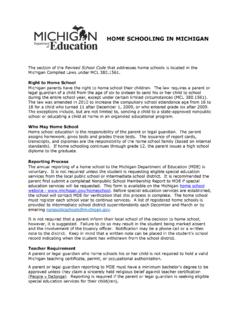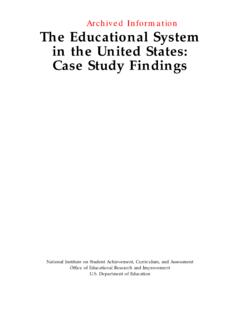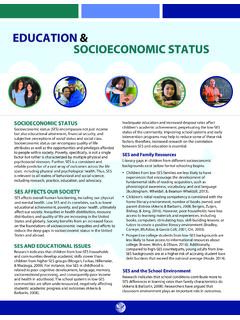Transcription of A Nation at Risk: The Imperative for Educational Reform
1 A Nation at Risk: The Imperative for Educational Reform A Report to the Nation and the Secretary of Education United States Department of Education by The National Commission on Excellence in Education April 1983 April 26, 1983 Honorable T. H. Bell Secretary of Education Department of Education Washington, 20202 Dear Mr. Secretary: On August 26, 1981, you created the National Commission on Excellence in Education and directed it to present a report on the quality of education in America to you and to the American people by April of 1983. It has been my privilege to chair this endeavor and on behalf of the members of the Commission it is my pleasure to transmit this report, A Nation at Risk: The Imperative for Educational Reform . Our purpose has been to help define the problems afflicting American education and to provide solutions, not search for scapegoats. We addressed the main issues as we saw them, but have not attempted to treat the subordinate matters in any detail.
2 We were forthright in our discussions and have been candid in our report regarding both the strengths and weaknesses of American education. The Commission deeply believes that the problems we have discerned in American education can be both understood and corrected if the people of our country, together with those who have public responsibility in the matter, care enough and are courageous enough to do what is required. Each member of the Commission appreciates your leadership in having asked this diverse group of persons to examine one of the central issues which will define our Nation 's future. We especially welcomed your confidence throughout the course of our deliberations and your anticipation of a report free of political partisanship. It is our collective and earnest hope that you will continue to provide leadership in this effort by assuring wide dissemination and full discussion of this report, and by encouraging appropriate action throughout the country.
3 We believe that materials compiled by the Commission in the course of its work constitute a major resource for all persons interested in American education. The other Commissioners and I sincerely appreciate the opportunity to have served our country as members of the National Commission on Excellence in Education, and on their behalf I remain, Respectfully, David Pierpont Gardner Chairman Members of the National Commission on Excellence in Education David P. Gardner (Chair) President University of Utah and President-Elect, University of California Salt Lake City, Utah Yvonne W. Larsen (Vice-Chair) Immediate Past-President San Diego City School Board San Diego, California William 0. Baker Chairman of the Board (Retired) Bell Telephone Laboratories Murray Hill, New Jersey Anne Campbell Former Commissioner of Education State of Nebraska Lincoln, Nebraska Emeral A. Crosby Principal Northern High School Detroit, michigan Charles A. Foster, Jr. Irnmediate Past-President Foundation for Teaching Economics San Francisco, California Norman C.
4 Francis President Xavier University of Louisiana New Orleans, Louisiana A. Bartlett Giamatti President Yale University New Haven, Connecticut Shirley Gordon President Highline Community College Midway, Washington Robert V. Haderlein Irnmediate Past-President National School Boards Association Girard, Kansas Gerald Holton Mallinckrodt Professor of Physics and Professor of the History of Science Harvard University Cambridge, Massachusetts Annette Y. Kirk Kirk Associates Mecosta, michigan Margaret S. Marston Member Virginia State Board of Education Arlington, Virginia Albert H. Quie Former Governor State of Minnesota St. Paul, Minnesota Francisco D. Sanchez, Jr. Superintendent of Schools Albuquerque Public Schools Albuquerque, New Mexico Glenn T. Seaborg University Professor of Chemistry and Nobel Laureate University of California Berkeley, California Jay Sommer National Teacher of the Year, 1981-82 Foreign Language Department New Rochelle High School New Rochelle, New York Richard Wallace Principal Lutheran High School East Cleveland Heights, Ohio A Nation At Risk - April 1983 Introduction Secretary of Education T.
5 H. Bell created the National Commission on Excellence in Education on August 26, 1981, directing it to examine the quality of education in the United States and to make a report to the Nation and to him within 18 months of its first meeting. In accordance with the Secretary's instructions, this report contains practical recommendations for Educational improvement and fulfills the Commission's responsibilities under the terms of its charter. The Commission was created as a result of the Secretary's concern about "the widespread public perception that something is seriously remiss in our Educational system." Soliciting the "support of all who care about our future," the Secretary noted that he was establishing the Commission based on his "responsibility to provide leadership, constructive criticism, and effective assistance to schools and universities." The Commission's charter contained several specific charges to which we have given particular attention.
6 These included: x assessing the quality of teaching and learning in our Nation 's public and private schools, colleges, and universities; x comparing American schools and colleges with those of other advanced nations ; x studying the relationship between college admissions requirements and student achievement in high school; x identifying Educational programs which result in notable student success in college; x assessing the degree to which major social and Educational changes in the last quarter century have affected student achievement; and x defining problems which must be faced and overcome if we are successfully to pursue the course of excellence in education. The Commission's charter directed it to pay particular attention to teenage youth, and we have done so largely by focusing on high schools. Selective attention was given to the formative years spent in elementary schools, to higher education, and to vocational and technical programs. We refer those interested in the need for similar Reform in higher education to the recent report of the American Council on Education, To Strengthen the Quality of Higher Education.
7 In going about its work the Commission has relied in the main upon five sources of information: x papers commissioned from experts on a variety of Educational issues; x administrators, teachers, students, representatives of professional and public groups, parents, business leaders, public officials, and scholars who testified at eight meetings of the full Commission, six public hearings, two panel discussions, a symposium, and a series of meetings organized by the Department of Education's Regional Offices; x existing analyses of problems in education; x letters from concerned citizens, teachers, and administrators who volunteered extensive comments on problems and possibilities in American education; and x descriptions of notable programs and promising approaches in education. To these public-minded citizens who took the trouble to share their concerns with us--frequently at their own expense in time, money, and effort--we extend our thanks. In all cases, we have benefited from their advice and taken their views into account; how we have treated their suggestions is, of course, our responsibility alone.
8 In addition, we are grateful to the individuals in schools, universities, foundations, business, government, and communities throughout the United States who provided the facilities and staff so necessary to the success of our many public functions. The Commission was impressed during the course of its activities by the diversity of opinion it received regarding the condition of American education and by conflicting views about what should be done. In many ways, the membership of the Commission itself reflected that diversity and difference of opinion during the course of its work. This report, nevertheless, gives evidence that men and women of good will can agree on common goals and on ways to pursue them. The Commission's charter, the authors and topics of commissioned papers, a list of the public events, and a roster of the Commission's staff are included in the appendices which complete this volume. A Nation At Risk All, regardless of race or class or economic status, are entitled to a fair chance and to the tools for developing their individual powers of mind and spirit to the utmost.
9 This promise means that all children by virtue of their own efforts, competently guided, can hope to attain the mature and informed judgement needed to secure gainful employment, and to manage their own lives, thereby serving not only their own interests but also the progress of society itself. Our Nation is at risk. Our once unchallenged preeminence in commerce, industry, science, and technological innovation is being overtaken by competitors throughout the world. This report is concerned with only one of the many causes and dimensions of the problem, but it is the one that undergirds American prosperity, security, and civility. We report to the American people that while we can take justifiable pride in what our schools and colleges have historically accomplished and contributed to the United States and the well-being of its people, the Educational foundations of our society are presently being eroded by a rising tide of mediocrity that threatens our very future as a Nation and a people.
10 What was unimaginable a generation ago has begun to occur--others are matching and surpassing our Educational attainments. If an unfriendly foreign power had attempted to impose on America the mediocre Educational performance that exists today, we might well have viewed it as an act of war. As it stands, we have allowed this to happen to ourselves. We have even squandered the gains in student achievement made in the wake of the Sputnik challenge. Moreover, we have dismantled essential support systems which helped make those gains possible. We have, in effect, been committing an act of unthinking, unilateral Educational disarmament. Our society and its Educational institutions seem to have lost sight of the basic purposes of schooling , and of the high expectations and disciplined effort needed to attain them. This report, the result of 18 months of study, seeks to generate Reform of our Educational system in fundamental ways and to renew the Nation 's commitment to schools and colleges of high quality throughout the length and breadth of our land.




